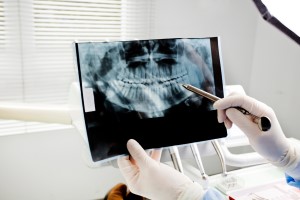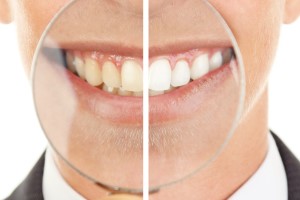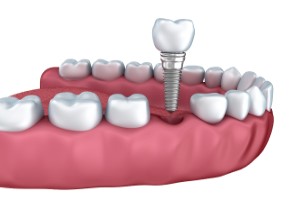When a Tooth Abscess Is a Dental Emergency

A tooth abscess is a dental emergency because it has a risk of the infection expanding to other parts of the body. If an abscess spreads to the brain, it can have life-threatening effects.
Abscesses can be incredibly painful, and the pain is often accompanied by swelling. The severity of the pain and swelling is often used to assess if an abscess counts as an emergency, since it is proportional to how much the infection has spread. Failing to treat an abscess promptly can lead to the infection spreading into the jawbone and other areas.
Getting treatment for a dental emergency
Anyone who notices an abscess should head to a dentist immediately for treatment, especially if it is accompanied by symptoms like difficulty breathing, headaches, problems swallowing, or a fever. These are typically signs that the infection is spreading to other parts of the body.
An abscess that causes headaches, earaches, or pain around the neck is a significant cause for concern because that is a sign that the infection might be spreading toward the brain. The dentist will evaluate the severity of the patient’s condition during their appointment by performing tests like physically touching the affected tooth to determine if it is sensitive to pressure or touch. Diagnostics like x-rays or CT scans might also be used to paint a clearer picture of what’s going on inside the tooth.
Abscess treatment options
Ways that a dentist might treat an abscess include the following:
Draining the abscess: This involves making an incision into the abscess so the pus inside it drains out. The area is then washed and disinfected with a saline solution. A rubber drain might be inserted into the incision so the area keeps draining as the swelling goes down.
Performing root canal therapy: This procedure is used to address an infection in a tooth. It entails using a dental drill to open up the pulp chamber, and then the tooth’s nerve and blood vessels are extracted. Medication is implanted into the pulp chamber to kill any infection there before sealing the tooth with gutta-percha. The tooth is then enclosed with a crown to hold it together, restore its aesthetics, and protect it against bite forces.
Extracting the infected tooth: In some cases, the most effective way to treat an abscess is by extracting the affected tooth. This is often a last resort when the dentist needs to stop the infection from spreading. The extracted tooth can then be replaced by an oral prosthetic.
Antibiotics: Some tooth abscesses can be treated by prescribing antibiotics. This approach helps to prevent the infection from spreading. It is often recommended for patients with weakened immune systems.
Frequently asked questions about tooth abscess
Let us go through the answers to frequently asked questions about tooth abscesses.
1. What occurs if a tooth abscess is left untreated?
An abscess can expand to other parts of the body when left untreated for weeks or months. The infection can be life threatening if it spreads to more delicate parts of the body, like the heart or brain. Leaving an abscess unaddressed can lead to severe symptoms, like fever, difficulty breathing or swallowing, confusion, and fatigue. A tooth abscess counts as a dental emergency because it requires immediate treatment to prevent potentially life-threatening symptoms.
2. How do dental abscesses form?
An abscess is often the result of a tooth infection that has been left unaddressed. It occurs when bacteria in the mouth get into the pulp chamber. The pulp chamber is the innermost layer of a tooth, and it contains connective tissues, blood vessels, and nerves. It is protected by two other layers, called the dentin and enamel. It is sealed off from the rest of the tooth so irritants like bacteria and saliva cannot reach it.
However, the layers of dentin and enamel protecting the pulp chamber can be damaged by tooth decay or trauma. As a result, the pulp chamber can be exposed to bacteria in the mouth, which leads to infection and eventually, an abscess. The only way to prevent an abscess from spreading to other parts of the body is by getting treatment from a dentist immediately.
Get the care that you need for your dental emergency
Are you dealing with a tooth abscess? Give us a call or head to our Jackson Heights clinic to get the treatment that you need for this dental emergency.
Request an appointment here: https://jacksonheightdental.com or call 82nd St. Dental at (718) 476-5555 for an appointment in our Jackson Heights office.
Check out what others are saying about our dental services on Yelp: Dental Emergency in Jackson Heights, NY.
Recent Posts
Dental bonding is one of the most versatile and minimally invasive restorative and cosmetic dental procedures. Dental bonding is the go-to procedure for many patients looking to fix imperfections or enhance their smile, from enhancing the appearance and shape of teeth to repairing damaged enamel. Whether you are new to cosmetic dentistry or considering touch-ups…
A dental bridge is a reliable, effective solution for tooth loss, as it offers functional and aesthetic benefits. This dental restoration helps improve chewing, speech, and overall oral health while maintaining the smile’s natural structure. Patients interested in bridges as tooth replacements can benefit from learning more about their basics, placement process, and long-term care…
A damaged or decayed tooth can affect your confidence and overall oral health. Fortunately, a same day crown can help restore your smile in a single dental visit. This efficient and innovative restoration allows you to improve your teeth without the lengthy process associated with traditional crowns.Same day crowns are custom-designed dental restorations prepared and…
All-on-4 dental implants can effectively restore a complete smile, offering a permanent and natural-looking alternative to traditional dentures. Many patients who have lost most or all of their teeth can qualify for this procedure, as it mainly requires good general and oral health. Learning about the basics of the All-on-4 procedure, its benefits, and eligibility…






